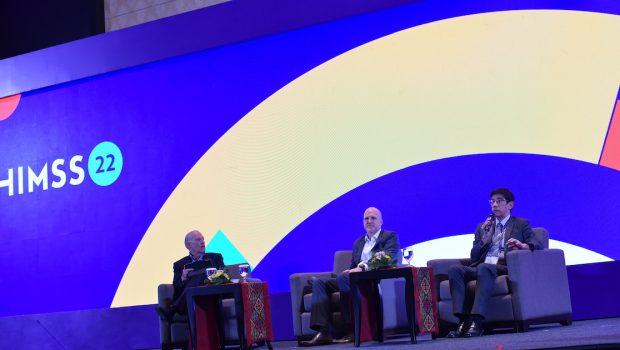Leveraging technology to retain staff amid the pandemic
By 2030, the world will be short of 15 billion healthcare workers, according to the World Health Organization.
"We really need urgent action to reverse this," said Bruce Steinberg, HIMSS Head of International and Managing Director, who moderated the closing keynote session "Tomorrow Came Yesterday: What's Next in the Workforce? A Glimpse into the Future of Healthcare" at HIMSS22 APAC.
"More importantly, we need more efforts to train, recruit, and retain the next generation of healthcare workers."
During this session, Professor Oscar Lee, Vice Superintendent and orthopaedic surgeon at China Medical University Hospital (CMUH), and Gareth Sherlock, CIO of Cleveland Clinic London, also shared insights into retaining healthcare staff amid growing infectious disease pandemics.
For Sherlock, the organisation's culture plays a crucial role in keeping talent. Early on, Cleveland Clinic considered everyone in their organisation, both clinical and non-clinical staff, as caregivers. "Because in some way, you are responsible directly or indirectly for the care of all the patients that we look after," he said.
On Prof Lee's end, it is important to take into consideration the perspective of healthcare workers' families.
According to him, organisations must employ technologies that will ensure work safety under life-threatening pandemics. "Not only [should it be] cut out for medical personnel, but also for the patients as well. The technology [must be] tailored to help medical personnel to come back."
In Cleveland Clinic's case, there are two considerations for IT projects: one, it must make the lives of clinicians and other caregivers easier and more efficient, and two, it must deliver a better patient experience. "If it's not doing one of those two, what are you doing it for?" Sherlock said.
Another strategy for staff retention is offering continuing education. Prof Lee shared that the CMUH has partnered with Taiwan AI School to provide evening courses to equip university faculty and hospital staff with fundamental concepts and knowledge of AI.
Attracting global talent
Sherlock claims that one thing that attracts medical talent to work for Cleveland Clinic is its global healthcare model.
He noted how applicants find it frustrating that many hospitals, especially those within a health system, work very independently and that their systems and processes are often disparate from other hospitals within the same system.
"People are attracted to Cleveland Clinic London Hospital [because] we use the same systems and the same processes as [those] at the main campus or in Abu Dhabi. And some of the technologies we are delivering are very, very cutting edge," Sherlock explained.
Meanwhile, Prof Lee said what sets them apart from other university hospitals in the region is that their institution is a "hub for innovation." At CMUH, he explained, medical residents are not only enabled to perform their professional duties but are also provided with an opportunity to work on health technology projects.
Getting everyone on board in digital transformation
In the many digital transformation projects in the UK, Middle East, and Australia that Sherlock has been involved in, all were clinically-led. "If they're not clinically-led, in my experience, they're not gonna be successful," he claimed.
For example, their clinicians were the ones who developed the workflows of the stroke programme in their hospital in Abu Dhabi, making the institution the stroke centre in the city. While the IT team built the very system beneath the programme, it was the clinical team who launched it and trained everyone on it, Sherlock said.
But communication between IT and care teams may come as a hindrance to efforts in digital health transformation.
To resolve this, Prof Lee has been convincing the university leadership to teach and orient medical students with technology.
"They don't have to be experts in Python; the bottom line is that they should be able to understand what people from IT can do for them and help them," he said.
Meanwhile, Sherlock referred to the Informatics department as a key to bridging the IT and clinical teams in digital transformation efforts.
He also advised that in any IT project, all staff from all levels of the organisation must be engaged from the beginning through its completion.
"They need to be part of the process so at the very end, [they are the] biggest advocates, they're the ones [who are] selling the programme."








Gloss